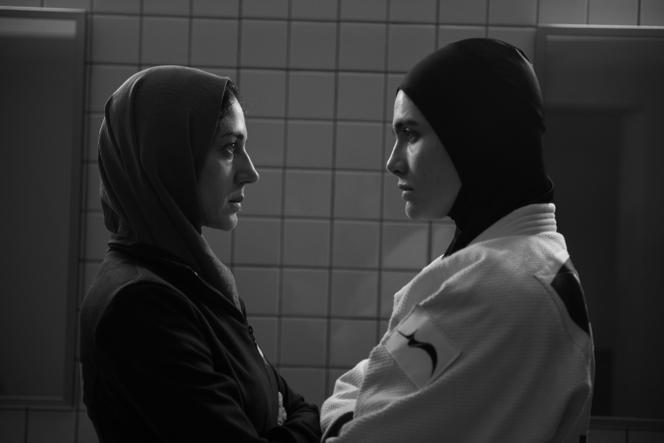


LE MONDE'S OPINION - SEE IT
It's rare enough to be worth noting right away: Tatami is the first film directed by an Israeli man and an Iranian woman, at a time when their countries are engaged in a war that is less and less dormant, having been rekindled by recent events in the Middle East. The two have something else in common: They have both left their homeland. Guy Nattiv, 51, emigrated to the US, where he lives and works. He has made five feature films to date, including Strangers in 2007 (an Israeli man and a Palestinian woman meet in Berlin) and Skin in 2018 (the redemption of a young American neo-Nazi). Zar Amir, 43, a well-known actress in Iran, went into exile in France in 2006 and won the Best Actress Award at Cannes in 2022 for Holy Spider, a film about a Persian serial killer by Ali Abbasi, a remarkable Danish filmmaker of Iranian origin.
Tatami, the project that brings them together, takes place during the Judo World Championships in Tbilisi, Georgia. The Iranian delegation sends its most successful athlete, Leila (Arienne Mandi), along with her coach, Maryam (Zar Amir), to win a gold medal. On her journey to the podium, however, Leila has to face an Israeli judoka.
The anti-Zionism of the Islamic Republic, which advocates a total boycott of the State of Israel as it awaits its destruction, has never allowed such a situation to arise. The steamroller is immediately set in motion, first from a distance by incessant phone calls, then through local diplomatic personnel, against the coach, demanding that she make the judoka obey.
Leila, a block of pure energy and an iron will, won't hear it. She wants to go all the way, whatever it takes. There seems to be no reason other than sports to explain her choice. From this point on, the creators interweave two dramaturgical threads. The first thread is Leila, whose stubbornness is clearly going to endanger not only herself, but also her family and friends back home who support her and to whom the production returns regularly.
And the second thread is Maryam, torn between her relationship with Leila, who is increasingly beyond her influence, and the threats she faces in Tehran. The depth of the character here lies in the fact that Leila's story repeats the one Maryam herself lived through a few years earlier as an athlete, without showing as much determination.
The film is solidly put together and can count on echoes in real life news that bounces from one event to the next – on July 28, at the Paris Olympics, Algerian judoka Messaoud Dris, who appeared to want to fight, deliberately displayed a disqualifying weight, probably under pressure from his government, when he was due to face his Israeli counterpart Tohar Butbul. The novelistic structure, with its overly repetitive mechanism, lacks complexity and impact. Waza-ari, then, rather than ippon.
You have 4.24% of this article left to read. The rest is for subscribers only.
